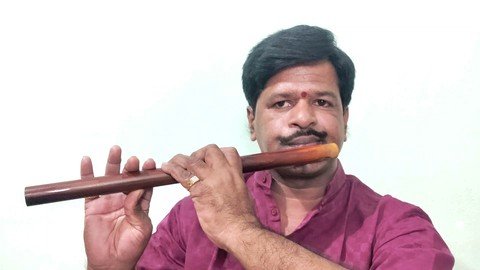
MP4 | Video: h264, 1280x720 | Audio: AAC, 44.1 KHz
Language: English | Size: 1.55 GB | Duration: 1h 11m
A course of Advanced level Krithis of Various Raagas in different Thaalas
What you'll learn
Students will get to learn the simple notations to understand and practice.
Students can easily pick up the fingering skills by learning line by line of the Krithis.
Students can practice and play along while watching the fingering and notations simultaneously.
Students can learn the Half Notes on Flute.
Requirements
Students need 2 and half (D#) pitch, 8 holes Carnatic Flute to practice the Krithis.
Description
Walking down the crowded streets of Thanjavur today, one can still find a measure of peace at the Bangaru Kamakshi temple, home to Goddess Kamakshi. Along with being a place of worship to the throngs of devotees and visitors, the Kamakshi temple is also home to one of the Trinities of Carnatic Music (Sangita Trimurti) - the musical genius and composer Shyama Shastri.
Born to Visvanatha Iyer and Vengalakshmi in a Tamil Brahmin family at Tiruvarur on April 26, 1762, Venkata Subrahmanya popularly known as Shyama Shastri was the eldest of the three jewels of Carnatic music - the distinguished trio of composer-musicians of Carnatic music including Tyagaraja, Muthuswami Dikshitar, and Shyama Shastri himself.
Shyama Shastri came from a family of priests, worshipers of the Goddess Kamakshi. Following political turmoil and fearing the threat of destruction of the temples and idols, Shayma Shastri's ancestors travelled along with the Kamakshi idol from place to place until they finally settled in the temple town of Thiruvarur.
During an evening of worship at the temple, Shyama once sang beautiful songs in praise of the Goddess Kamakshi. His listeners were enthralled and as a token of their appreciation, gifted the boy with a beautiful shawl. Shyama went home and showed it to his uncle, who, angered by his musical pursuits, ended up shredding his music book to pieces. This was hardly a deterrent for the little boy, who believed that the Goddess Kamakshi would continue to inspire and guide his music.
Shyama Shastri was a Devi Bhakt (devotee of the Goddess) and Archak (priest) at the temple of Goddess Bangaru Kamakshi, where his forefathers were priests for several years. Most of his compositions are paeans of Devi Kamakshi.
Shyama Shastri was not interested in worldly pursuits. During his lifetime, the arts were flourishing due to the patronization of the kings, but Shastri would not show any interest in being a court musician. Over his lifetime, Shyama Shastri would go on to compose nearly 300 krithis in praise of the Goddess. He also created Navaratnamalika which is a set of nine compositions praising the Goddess Meenakshi of the famed Meenakshi Temple in Madurai. He would go on pilgrimage tours and create compositions on deities of the temples he visited. He wrote compositions praising Tiruvaiyaru Dharmasamvardini, Nagapattinam Neelayadakshi, Thiruvanaikaval Akhilandeswari, one Tana Varnam on Kanchi Varadaraja and one krithi on Vaidheeswarankovil Muthukkumaraswamy.
Shyama Shastri adopted common as well as rare ragas for his compositions. Though his compositions were in three languages -Tamil, Telugu, and Sanskrit - he preferred Telugu as the medium of expression. He is the only one among the 'Trinity' to have composed in Tamil. "Ratnatrayam" is the name given to his popular set of three Swarajati(s) - Kamakṣhi Anudinamu in Raga Bhairavi, Kamakṣhi Padayugame in Yadukula Kambhoji, and Rave Himagiri Kumari in Raga Todi. Shyama Shastri has composed masterpieces in Ragas like Anandhabhairavi (said to be one of his favorites) and Saveri. Shastri lived in Thanjavur at a time when the music and arts were flourishing due to the patronization of many kings. He was a contemporary of Saint Tyagaraja and Muthuswami Dikshithar.
Shyama Shastri signed his compositions - Kritis, Varṇam(s) and Swarajati(s) with his Mudra (Signature) 'Shyama Krishna'.
Most of his compositions were scholarly in nature. Unlike his contemporaries, he did not have many disciples and yet his compositions have been propagated, popularized and admired over the centuries.
On February 6, 1827, he at the age of 65, this great Kamakshi devotee breathed his last.
Who this course is for
Students who are interested in advanced level of Classical compositions
Homepage
https://www.udemy.com/course/learn-carnatic-flute-shyama-shastri-krithis-vol-1/Buy Premium From My Links To Get Resumable Support,Max Speed & Support Me
https://hot4share.com/zov7y69rm33u/unhq5.L.C.F..S.S.K..V.1.rar.html

https://uploadgig.com/file/download/49310570E70787cb/unhq5.L.C.F..S.S.K..V.1.rar

https://rapidgator.net/file/3d3a4acd8edf2eaafde06ce3a09ced80/unhq5.L.C.F..S.S.K..V.1.rar.html

http://nitro.download/view/E0E8A34D07FF206/unhq5.L.C.F..S.S.K..V.1.rar
Links are Interchangeable - No Password - Single Extraction
